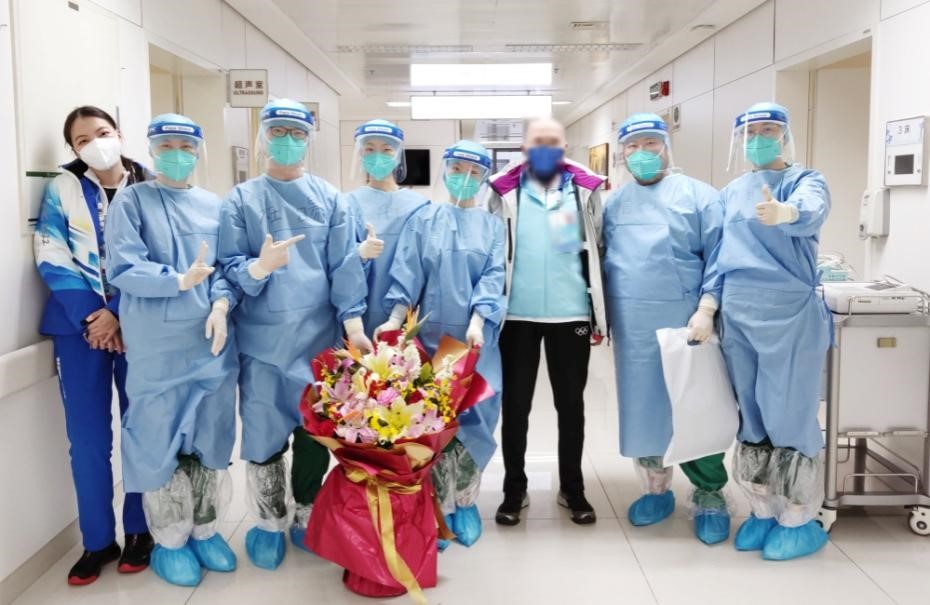On February 7, 2022, I was on duty in the Winter Olympics Ward when I suddenly received a huge bouquet of flowers. This is the birthday flower specially brought to me by Mr. G, who came for the follow-up consultation. It is also the thank-you flower he gave to all the medical staff in the Winter Olympic Ward.
On February 2, the second day of the new year by the Chinese lunar calendar, it was my birthday and also the birthday of Chief Physician Shi Xiaochun, who was also working in the Winter Olympic Ward. Earlier our colleagues prepared for our birthday celebration, which, unexpectedly, was not started until midnight.
At 11:45, the medical service station sent a message that Mr. G, who had severe low back pain, would be transferred to the Winter Olympic Ward for treatment. Because the patient’s condition was complicated with many underlying diseases, pre-diagnosis multidisciplinary consultation was needed, and the Winter Olympic Ward immediately entered a “wartime state”.
At 13:28, the medical station sent another emergency message, Mr. K, an international patient with sudden chest pain and hematemesis, needed urgent referral.
After seeing Mr. K, we first ruled out the possibility of acute coronary syndrome. Because the patient vomited a coffee-like substance, the occult blood test was positive and the diagnosis was upper gastrointestinal bleeding. Since Mr. K booked a flight ticket for the next day to return to his home country, in order to stabilize his condition in the shortest possible time, he decided to undergo emergency gastroscopy after two multidisciplinary consultations. The medical department urgently convened departments including gastroenterology, anesthesiology, and cardiology to discuss the preoperative operation together, and fully communicated with the patient, and finally decided to perform gastroscopy under general anesthesia with tracheal intubation to clarify the location and cause of bleeding. Fortunately, no active bleeding lesions were found by gastroscopy. After the patient was given acid inhibitor and gastrointestinal prokinetics, the patient's condition improved rapidly.
At the same time, Mr. G, who was originally scheduled to come to see a doctor at 5 p.m., also arrived at PUMCH, and Dr. Xiao Yiding and I were in charge of the consultation. Mr. G, an 80-year-old elderly patient, had to lie on a hospital bed due to severe low back pain. His hearing was weak on both sides, so Dr. Xiao and I squatted and spoke to his ears throughout the inquiry about his condition.
Subsequently, the Department of Orthopedics Surgery, the Department of Anesthesiology and the Department of Physical Medicne and Rehabilitation conducted detailed assessments on Mr. G. After multidisciplinary discussions, considering that Mr. G suffered from waist and back myofascitis, the doctors performed a lumbar MRI examination for him, and adjusted the medications while giving him physical therapy. After treatment, Mr. G’s low back pain was significantly improved, and he was able to turn over and get out of bed on his own before leaving PUMCH. When all medical work was completed and we returned to the apartment, it was near midnight. Our colleagues lit birthday candles for Dr. Shi Xiaochun and me and sang the happy birthday song for us. As the clock struck zero, this memorable birthday passed quietly.
On February 13, Mr. G had his last follow-up visit before leaving China for his home country. I gave him a coffee cup featuring the painting “Frolic on the Ice in Imperial Palace” and told him about the long history of ice sports in China. Mr. G liked this gift very much and said that he was deeply impressed by the heart-warming and high-quality medical services of PUMCH.

Photo of Mr. G and medical staff members of the Winter Olympic Ward
Written by Qian Junyan from the Department of Internal Medicine
Picture courtesy of the Winter Olympic Ward
Translator: Liu Haiyan
Editor: Qian Junyan and Wang Yao
